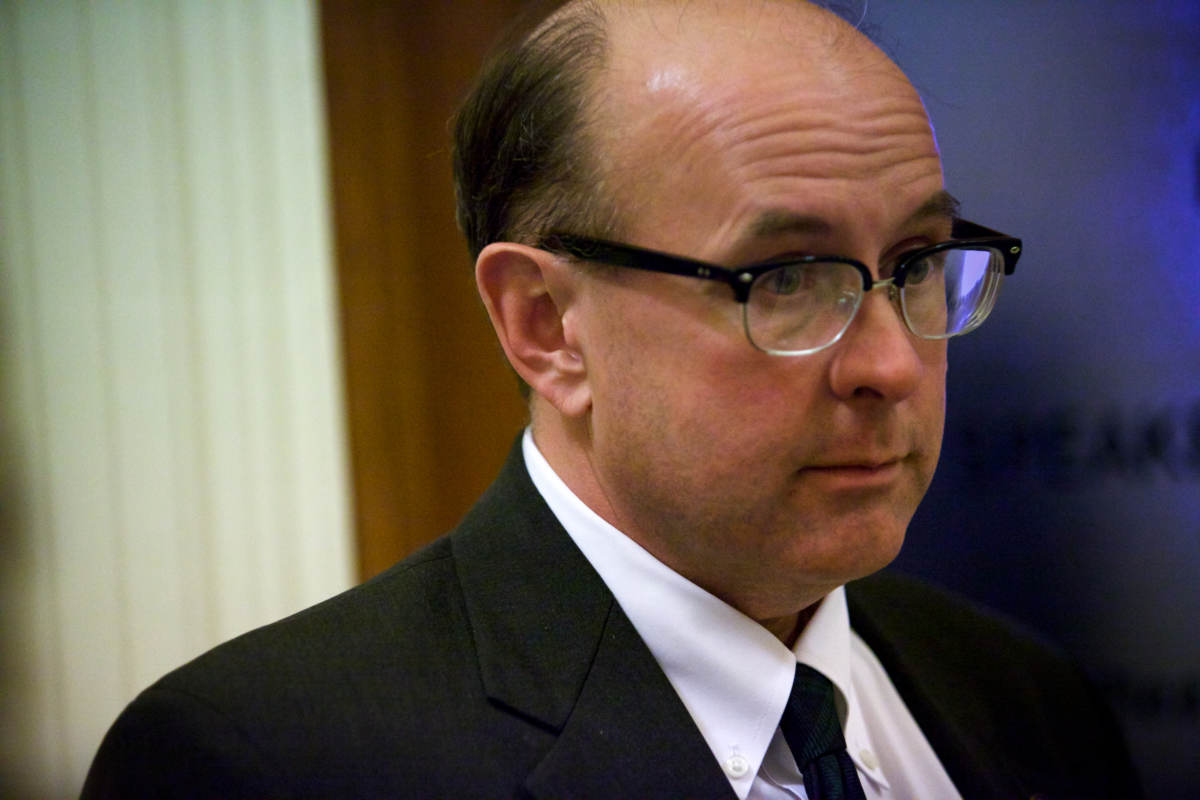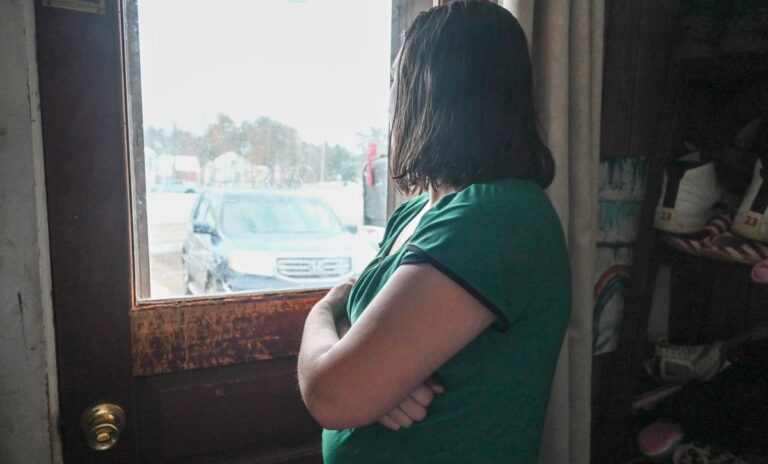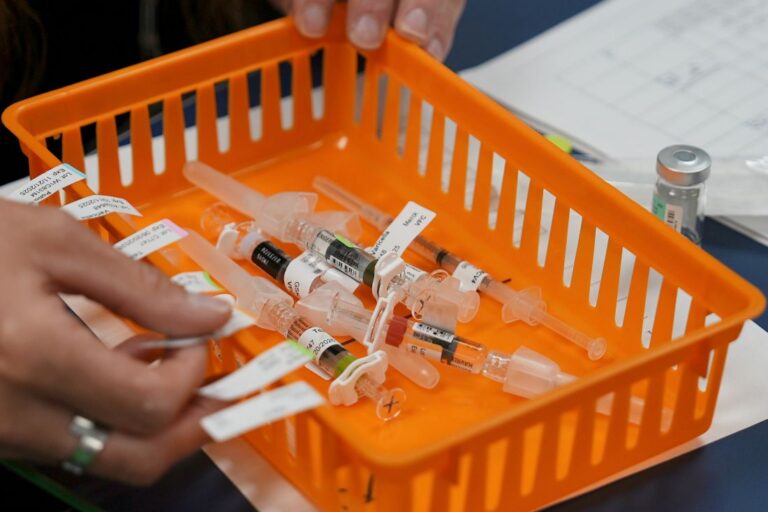Before the first case of the coronavirus hit Maine in March, U.S. Senate hopeful Tiffany Bond was on track to have the 4,000 signatures she needs to get on the November ballot. Unaffiliated with a major political party, Bond is attempting to unseat Republican Susan Collins in one of the closest-watched senate races in the nation.
On March 13, Bond was headed from the courthouse in Portland to City Hall to drop off 450 signatures so they could be verified. It was late afternoon, and shortly before she arrived, she found out City Hall had been closed early because a city worker was presumed positive for COVID-19.
Since then, state-ordered social distancing requirements — and a stay-at-home order effective April 2 — have meant Bond and her volunteers can no longer go door-to-door to get signatures. She can’t set up a table at the local grocery store to grab voters on their way out.
She also faces a hurdle to get the signatures she has gathered notarized because face-to-face transactions are limited. An executive order signed by Gov. Janet Mills on April 8 that Bond thought would give her a workaround — it allows video and audio notarizations for certain transactions — specifically exempts the nomination forms she needs to have notarized.
Bond has about 2,500 signatures — but no viable way to get any more.
“You can’t collect signatures during a pandemic,” said Bond, a Portland attorney and independent making her second bid for federal office.
In addition to upending everyday life — schools are closed, businesses not considered essential are shuttered, restaurants are restricted to take-out orders, thousands of Mainers are working from home and those that are not have filed for unemployment in record-breaking droves — the global coronavirus pandemic is also changing political life.

Voters in Wisconsin waited in long lines last week wearing face masks and standing 6 feet apart after the U.S. Supreme Court denied the Democratic governor’s request to delay the vote. In Ohio last month, the Republican governor defied a court order that the primary be held as scheduled by declaring a public hearing emergency.
And in Maine on Friday, Mills signed an executive order to move the state’s primary election from June 9 to July 14 to allow more time for voters to request absentee ballots and to give election officials time “to ensure that in-person voting can be done in as safe a way as possible,” Mills said in a statement.
The order also gives Bond and other independents a one-month extension to turn in their signatures, changing the deadline from June 1 to July 1. But Bond and three other independents hoping to take on Collins say in practice, that’s not likely to help much.
“It sounds good on the surface, but until the stay-at-home order is lifted, we can’t go out and get signatures,” said Leigh Hawes, a Skowhegan truck driver who entered the race March 1.
For them, the threat of non-major party candidates being unable to make it onto the ballot in Maine has implications broader than a longshot path to Washington. It’s about being able to have fair representation before voters.
Just how long Mainers will be ordered to stay at home is unclear, with cases of coronavirus continuing to rise. Tuesday’s number reached 734 cases in 15 counties with 20 deaths, according to the Maine Center for Disease Control and Prevention.
Beating the deadline
While Bond, Hawes and Linda Wooten of Auburn, a former Republican party activist also seeking to run as an independent in the Senate race, say they are worried about getting their signatures, one candidate beat the deadline and turned in her signatures last week.

Independent Lisa Savage turned in more than 5,500 signatures but said she favors more accommodation so other candidates have a shot at making the ballot as well. Savage was formerly a Green Independent candidate, but dropped her party affiliation earlier this year when she was unable to get the signatures she needed to make the deadline for members of political parties.
Party candidates — Democrats, Republicans and Green Independents — had until March 16 to file 2,000 signatures from fellow party members with the Secretary of State to get on the primary ballot.
Unenrolled candidates — sometimes called independents — can get signatures from any registered Maine voter, but they must turn in 4,000 valid signatures by July 1.
Savage deployed an army of volunteers on Super Tuesday, March 3, to get most of her signatures.
“We are confident that long before June 1 we will hear we are on the ballot,” Savage said Monday morning from her home in Solon.
Savage said she wrote to state officials saying that she feels that anyone who took out nomination petitions who has made a good faith effort to get the signatures should be allowed to be on the ballot.
“Public health is the No. 1 priority,” she said. “Bending the rules a little in a global pandemic I don’t think would be unfair.”
Ranked-choice implications
Maine’s use of ranked-choice voting for this race complicates the picture.
In 2018, during the first race that used ranked-choice voting in Maine, U.S. Rep. Jared Golden, a Democrat, defeated Republican incumbent Bruce Poliquin in the 2nd Congressional District.
Although Poliquin had the most votes on election night, once Bond’s second-place votes were added to Golden’s total, he was declared the winner.
Savage credits Bond with Poliquin’s defeat.
“Tiffany Bond was crucial in unseating Bruce Poliquin in the 2nd District,” she said. “Jared Golden only took Bruce Poliquin’s seat because of her. I feel like I owe her. She’s been extremely friendly, cooperative and collaborative.”

Sandy Maisel, a Colby College professor who specializes in American political parties and elections, said that the ranked-choice voting system encourages non-major party candidates to run.
For instance, unenrolled candidates who have a strong following can reassure voters that it’s OK to choose them first on the ballot, even if they are running a long-shot campaign because they can choose a more traditional candidate as a second choice, he said.
“They can say vote for me and choose Sara Gideon as your second choice,” he said, referencing Collins’ leading Democratic rival and Maine’s Speaker of the House. “That’s how ranked-choice voting is supposed to work. It gives these people an opportunity to speak to voters.”
While he said the inability of unenrolled candidates to make it onto the November ballot due to coronavirus restrictions raises issues about fairness, he doesn’t think it will affect the outcome of the election or take potential votes away from Collins or her challengers.
“In order for it to have that kind of effect, you’re going to have to assume that (people) are not going to come out to vote if they’re not going to be able to vote for this candidate,” he said. “Since there’s going to be a presidential race at the top of the ballot, I think that’s a very unlikely assumption. So I don’t think that having difficulty getting on the ballot is going to have much effect on this senate race.
“If we’re talking about doing this in an off-year election, there may be the case that some of those people would not come out to vote if they couldn’t vote for their candidate,” he added.
‘In dire need’
Further complicating matters for Bond and others is the need to have each sheet of signatures notarized, Bond said. Although Mills signed an executive order to allow some notarizations to be done via an audio-video system, nomination petitions were exempt from the order, as were solemnizing marriages, absentee ballots and direct initiative or referendum petitions.
“We shouldn’t be excluding people from democracy because they are not in a (political) party,” Bond said. “They should just say you need half as many signatures and here’s how to get them notarized.”

Secretary of State Matt Dunlap said while the state gave unenrolled candidates an extra month to get signatures, reducing the number mandated by state law “was never part of the discussion.”
“It would be a little problematic because the party candidates have all qualified,” he said. “I can only imagine the lawsuits that would follow.”
Dunlap also explained that the deadline for unenrolled signatures falls just prior to the party primary so party candidates who lose can’t unenroll after the election and run again for the same office as an independent.
When it comes to notarization, Dunlap said candidates may have to get creative with social distancing to get it done.
“It’s not impossible to manage it,” he said. “It may take a little creativity and patience.”
For Bond, the inability to safely gather signatures in a pandemic and now the difficulty of getting them notarized may mean she will not get a chance to run in November in one of the most highly anticipated Senate races in the country. Collins, a Republican, is seeking her fifth term in the Senate. Democrats will choose their nominee July 14 from among three candidates: Gideon of Freeport, former State House lobbyist Betsy Sweet of Hallowell and attorney Bre Kidman of Saco.
Although Collins won re-election in 2014 in convincing fashion — garnering 68.5 percent of the vote — the race this year is considered a toss-up by Inside Elections, a Washington DC-based non-partisan analyst.
In a normal year, unenrolled candidates have from Jan. 1 to June 1 to gather their signatures, which can come from any registered Maine voter. Although the deadline to get the forms to the secretary of state is now July 1, they must be submitted to cities and towns for verification no later than June 26.
“I was on pace,” Bond said Thursday, adding that if she had been able to continue her efforts “I probably would have been done collecting this week.”

Wooten said via email that she, Bond and Hawes had reached out to the state to see if there could be an easing of the guidelines. On Saturday, she said the four-week extension put in place by the governor “is not a good decision.”
“I have less than a quarter of what I need to be on the ballot,” Wooten said. “I wished the governor allowed a decrease (in signatures) along with an extension.”
Wooten noted that in New York, the number of required signatures for political candidates was decreased in response to the coronavirus. On March 14, New York Gov. Andrew Cuomo signed an executive order making several changes to election laws, including reducing the number of signatures needed to get on the ballot to 30 percent of the number listed in law, according to Politico.
Someone running for Congress in New York now needs only 375 signatures, down from 1,250, Politico reported. Neither of that state’s U.S. Senators — Kirsten Gillibrand nor Chuck Schumer — are up for re-election this year.
Like the others, Wooten said extending the deadline is only one part of the puzzle.
“The Democrats and Republicans already have their signatures because they have municipal, county and state meetings in which many gathered and signed before the virus came upon us,” she wrote. “The rest of us are in dire need of signatures.”
Hawes, who ran as a write-in candidate in the 2014 2nd Congressional District race, said he’s motivated to run because he doesn’t think veterans get enough help from the federal government. And although he doesn’t support ranked-choice voting, he said he’s ready to see if what supporters say about it is true — that it gives independent candidates a fighting chance.
He launched his campaign March 1 and said he’s got about 500 signatures so far. He said he’s sent several emails to the Secretary of State’s Office “asking them ‘how are we going to get on the ballot?’”
“I get the impression that we’re not important,” he said. “They’ve got their primary party candidates and they don’t give us much credit for what we do.”







